Recombinant Mouse B7-H3/CD276
| Product name: | Recombinant Mouse B7-H3/CD276 |
| Source: | Human Cells |
| Purity: | Greater than 95% as determined by reducing SDS-PAGE. |
| Buffer Formulation: | Lyophilized from a 0.2 μm filtered solution of PBS, pH 7.4. |
| Applications: | Applications:SDS-PAGE; WB; ELISA; IP. |
| Storage: | Avoid repeated freeze/thaw cycles. Store at 2-8 oC for one month. Aliquot and store at -80 oC for 12 months. |
| UOM: | 100ug/50ug/200ug/1mg/1g |
SourceHuman CellsDescriptionRecombinant Mouse B7 Homolog 3 is produced by our Mammalian expression system and the target gene encoding Val29-Phe244 is expressed with a 6His tag at the C-terminus.NamesCD276 antigen, CD276, B7 homolog 3, B7-H3,CD276Accession #Q8VE98FormulationLyophilized from a 0.2 μm filtered solution of PBS, pH 7.4.ShippingThe product is shipped at ambient temperature.
ReconstitutionAlways centrifuge tubes before opening. Do not mix by vortex or pipetting.
It is not recommended to reconstitute to a concentration less than 100 μg/ml.
Dissolve the lyophilized protein in ddH2O.
Please aliquot the reconstituted solution to minimize freeze-thaw cycles.StorageLyophilized protein should be stored at < -20°C, though stable at room temperature for 3 weeks.
Reconstituted protein solution can be stored at 4-7°C for 2-7 days.
Aliquots of reconstituted samples are stable at < -20°C for 3 months.PurityGreater than 95% as determined by reducing SDS-PAGE.
EndotoxinLess than 0.1 ng/µg (1 IEU/µg) as determined by LAL test.Amino Acid Sequence
ReconstitutionAlways centrifuge tubes before opening. Do not mix by vortex or pipetting.
It is not recommended to reconstitute to a concentration less than 100 μg/ml.
Dissolve the lyophilized protein in ddH2O.
Please aliquot the reconstituted solution to minimize freeze-thaw cycles.StorageLyophilized protein should be stored at < -20°C, though stable at room temperature for 3 weeks.
Reconstituted protein solution can be stored at 4-7°C for 2-7 days.
Aliquots of reconstituted samples are stable at < -20°C for 3 months.PurityGreater than 95% as determined by reducing SDS-PAGE.
EndotoxinLess than 0.1 ng/µg (1 IEU/µg) as determined by LAL test.Amino Acid Sequence
VEVQVSEDPVVALVDTDATLRCSFSPEPGFSLAQLNLIWQLTDTKQLVHSFTEGRDQGSAYSNRT ALFPDLLVQGNASLRLQRVRVTDEGSYTCFVSIQDFDSAAVSLQVAAPYSKPSMTLEPNKDLRPG NMVTITCSSYQGYPEAEVFWKDGQGVPLTGNVTTSQMANERGLFDVHSVLRVVLGANGTYSCLVR NPVLQQDAHGSVTITGQPLTFHHHHHH
BackgroundCD276, also known as B7-H3, is a member of the B7 superfamily with signature IgV and IgG regions in extracellular domains. It is a type I transmembrane protein and shares 20–27% amino acid identity with other B7 family members. B7-H3 is involved in the activation of T lymphocytes, and regulates murine bone formation. It is also reported that B7-H3 may play an important role in muscle-immune interactions, providing further evidence of the active role of muscle cells in local immunoregulatory processes. B7-H3 is expressed on T-cells, natural killer cells, and antigen presenting cells, as well as some non-immune cells, such as osteoblasts, fibroblasts, fibroblast-like synoviocytes and epithelial cells. High expression of B7-H3 in tumor vasculature also correlates with poor survival in patients, suggesting that it may play a role in tumor cell migration.













